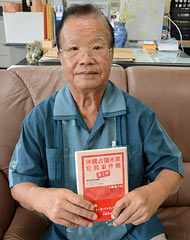Book on the crimes of U.S. Occupation Forces against Okinawan people is published by a former OPG official

Author Morio Tengan, former director of Koza Labor Management Office of the OPG with his book: “The Record of Crimes Against the Okinawan People by U.S. Military Occupation Forces - Volume 2,” September 16, at the Chubu Office of Ryukyu Shimpo in Okinawa City.
September 26, 2011 Ryukyu Shimpo
A book entitled “The Record of Crimes Against the Okinawan People by U.S. Military Occupation Forces – Volume 2” was published recently by 72 year-old Morio Tengan, a resident of Uruma City and former director of the Koza Labor Management Office of the Okinawa Prefectural Government (OPG). Tengan explained his reason for publishing this book saying, “I want the next generation of people to understand the hardships that Okinawa’s grandmothers and grandfathers have endured since Japan’s defeat in the war.” In the book, Tengan covers crimes by committed by U.S. military against local people during the 20-year period of military administration from the ratification of the San Francisco treaty in April 1952, when Okinawa was separated from Japan, until the Okinawa reversion to Japan in 1972.
Tengan was employed by the Legal Affairs Division of the Ryukyu Government after graduating from Hosei University. He subsequently moved steadily through the ranks, before going on to serve as the secretary-general of the Okinawa Prefectural Foundation for Claims Regarding U.S. Acquired Assets. He has worked as a specialist on the handling of claims by victims of a large number of crimes by the U.S. military and its personnel.
In his first book, published in 1999, he wrote about U.S. military crimes during the period between the date of the end of the war, August 15, 1945, and April 27, 1952. In this second book, using materials from the time, he has faithfully recorded the cases of murder, rape, hit-and-run, and other crimes by U.S. military personnel. Readers soon come to understand what he terms: “The period when Okinawan people had no human rights.”
In the first part of this book Tengan describes Okinawa as a junkyard of U.S. bases, suggesting that despite 66 years having passed since the end of World War II, “Okinawa is located amongst U.S. bases” because both the Japanese and United States governments have forced huge military bases on Okinawa, which represents less than one percent of the total land area of Japan.
In the second half of the book, called “The criminal record of the U.S. Military Occupation Forces,” he classified cases under the headings of “rape,” “crimes with guns,” “assault causing injury,” “robbery, theft, assault, and destruction of property” and others.
Tengan said, “In my two books I have recorded many of the crimes committed by U.S. soldiers, but this is just the tip of the iceberg – the number of crimes committed by the U.S. military and its personnel has not decreased since the reversion of Okinawa to Japan, and the people of Okinawa prefecture are still oppressed.”
The book sells for 1500 yen. Please direct inquiries to phone number 098 (973) 4356.
(English Translation by T&CT, Mark Ealey)
Previous Article:Ferry bringing commodities arrives at Kita and Minami Daito islands after 18 days
Next Article:Japan Nuclear Fuel considered Yaeyama as a repository for radioactive waste
[Similar Articles]
- Foreign Ministry document reveals that 1000 crimes were committed by U.S. military personnel in the twelve months before the reversion of Okinawa
- Low indictment rate for crimes involving U.S. military personnel in Okinawa
- Crimes involving US servicemen violating criminal code in Okinawa accounts for 45 % of recorded crime in Japan
- Japan National Governors’ Association study on U.S. military crime shows nearly half occurs in Okinawa
- [Editorial]
U.S.-Japan Status of Forces Agreement needs to be revised for cases involving civilian employees of the military “on duty”
 Webcam(Kokusai Street)
Webcam(Kokusai Street)


